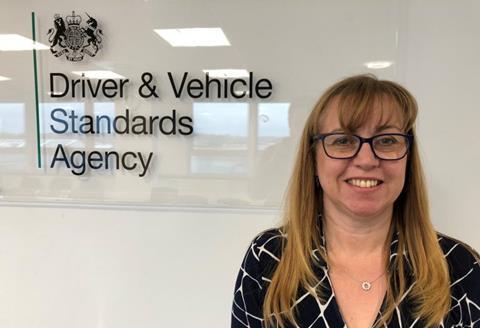
Marian Kitson joined the DVSA as director of enforcement in September 2018 after 32 years with HMRC. Speaking to MT editor Steve Hobson at the Microlise Transport Conference in May, Kitson said the agency’s flagship Earned Recognition scheme for the most compliant operators was going well.
“We now have 7% of the fleet in there, that is 96 operators with 240 licences,” she said. “It's the cornerstone of enforcement and an assurance they are meeting the standards consistently.
“At the roadside we mark them as blue and we don't stop their vehicles unless we see something that is an immediate safety hazard. Earned Recognition is different from a green OCRS which doesn't mean everything is fine. We have more assurance with Earned Recognition because we get the monthly update to tell us everything is being maintained properly - it is an extra level of assurance and it is an elite scheme.”
Being in Earned Recognition means sending the DVSA a four-weekly email confirming that vehicle maintenance and drivers’ hours are within agreed KPIs, which are typically set at 97% or 98% compliance.
“I'm not going to make it easy as the integrity of the scheme is paramount,” said Kitson. “We will work with anybody who wants to meet the standard. We would love to work with the industry to promote Earned Recognition and that is why I'm here at Microlise.
“In my poll 15% of operators said they were ready and 30-40% said they were nearly ready. If I could get 20% of the fleet in Earned Recognition in next 12 months that would send a message to the whole industry. It also sends a message to the businesses who we want to look for an Earned Recognition operator.”
One potential pitfall with Earned Recognition is that more scarce DVSA resources could be spent moving the already fairly compliant up to the very compliant level rather than focusing on the real rogues who are nowhere near compliant.
“I've built my team and have more people on the Earned Recognition team,” said Kitson. “There are colleagues who will go up and down the country to speak to businesses. We are ready to go. I don't know yet when Earned Recognition will start to free up resource. We spent 12 months growing the scheme carefully and we understand how it works now we have had the monthly reports from those 240 licence holders in the scheme.
“The key is swift intervention. We may not have to do a lot - it may just be a phone conversation to find out what has gone wrong. One of the benefits of the scheme is to have direct contact into DVSA.”
Kitson is confident that she has the resources required to keep dangerous vehicles and drivers off the roads.
“We are putting intense scrutiny on the non-compliant and this is where my background in enforcement comes into play,” she said. “If we find someone who has made a mistake we nudge them in the right direction. If we find someone who has been deliberately non-compliant they will get much more intensive support. We have a pilot running now to look at a small number of businesses in that way and we will build on that pilot as we get more of understanding of how that works. I want to work carefully with sources of intelligence using robotics or information technology so we focus intelligence on targeting those operators more effectively.
“Real rogues are hard to identify but I want my teams to be less predictable. We do road safety checks on the strategic road network and are working with Highways England on that. What we are looking for are more opportunities to be less predictable and look at what the data tells us about when the traffic is on the roads that might represent a risk so my people are on those roads at those times.
“The statistics will tell you that our roads are among the safest in Europe so I believe I have the resources I need but we can always do better. We are not complacent.”
The DVSA works closely with the traffic commissioners (TCs) to target non-compliant operators and take them off the road if necessary.
“I have regular interaction with [senior TC] Richard Turfitt and we understand our separate responsibilities,” said Kitson. “I completely respect the TCs' independent integrity and it is often the evidence that my examiners provide that supports the public inquiries that the TCs will hold.
“Like road safety it isn't perfect and we can always improve but we have really effective communication with all the TCs. I have met all the TCs and I welcome the opportunity to work alongside them but I respect our different roles.”
Kitson reacted strongly to suggestions that traffic examiners were being pulled off roadside checks to fill annual testing shifts at private authorised testing facilities (ATFs).
“That is not the case,” she insisted. “I think it happened before I joined but it is not happening now. DVSA has cancelled a tiny percentage of test slots.”
She also revealed that the DfT is considering allowed Earned Recognition operators to employ their own inspectors to carry out annual tests on their vehicles.
“The minister is telling us he is not confident of the ability of the industry to move to self-testing but he wants to look at it again in another year's time for Earned Recognition operators, so that might be another benefit for Earned Recognition operators in the future.”













